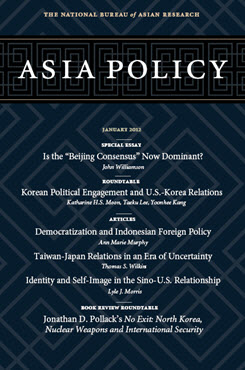Korean Political Engagement and U.S.-Korea Relations
The first two essays in the roundtable paint a clear picture of the emerging political influence of the Korean-American community. The authors examine the community’s demographic make-up and connections with South Koreans in order to better understand Korean Americans’ general perspectives, in which policy areas they are politically effective, and the political role and influence Korean Americans might develop in the future. The third essay closely traces the development of Korean civil society since democratization in 1987 and examines the role that civil society actors (including NGOs, students, activists, Internet-based communities, and think tanks) play in domestic Korean politics as well as in U.S.-ROK relations.
The first two essays in this roundtable, “Ethnicity and U.S. Foreign Policy: Korean Americans” by Katharine H.S. Moon and “Koreans in America: A Demographic and Political Portrait of Pattern and Paradox” by Taeku Lee, paint a clear picture of the emerging political influence of the Korean-American community. The third essay, “Korean Civil Society and Trust-Building between South Korea and the United States” by Yoonhee Kang, discusses the rise and growth of Korean civil society since democratization in 1987 and analyzes the implications for trust-building between Korea and the United States.
About Asia Policy
Asia Policy is a peer-reviewed scholarly journal presenting policy-relevant academic research on the Asia-Pacific that draws clear and concise conclusions useful to today’s policymakers. Asia Policy is published quarterly in January, April, July, and October and accepts submissions on a rolling basis. Learn more


